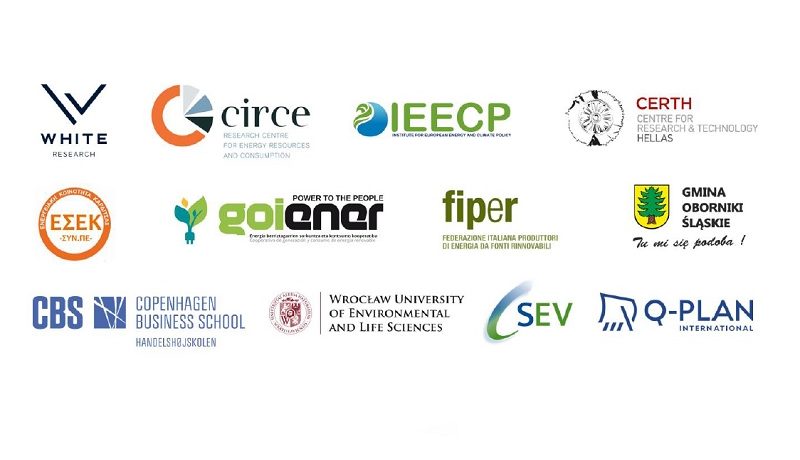People-powered energy system: activating the community energy market for bioenergy. In the updated Renewable Energy Directive II (RED II), the EU clearly considers community energy as a key factor for future Renewable Energy (RE) market uptake and mandates Member States to implement regulatory frameworks for enabling and facilitating this process.
At the same time, several barriers prevent citizens from becoming (bio)energy producers and bioenergy projects to be more appealing. Among others, lack of preparedness for communities to tap the full bioenergy market potential1, lack of bioenergy stakeholders’ awareness of the potential of communities and missing/ unsupportive (local, regional and national) framework and policy conditions.
For a people-powered energy system, the Horizon 2020-funded project BECoop (2020-2023) aims at putting communities in charge of their local renewable (bio)energy generation.
Although significant progress has been made in the EU towards a more effective clean-energy transition, there is still an increasingly uneven penetration rate of RE across energy sectors.
Remarkably, a rather slow penetration in the EU heating and cooling sector is observed, which accounts for 51% of EU’s total energy consumption and is expected to account for the largest share of demand by 2050. Understanding the need for accelerating efforts, the EU has adopted a target for a 1.3% annual increase in renewable heat during this next decade.
Alongside the challenging nature of increasing RE heating penetration, there is, at the same time, a significantly untapped RE market uptake potential that should be seriously considered, bioenergy.
Deriving from living organic materials, bioenergy can be used to produce, among else, electricity, heat, and fuels. Even though not fully exploited, it holds, in practice, the highest potential for replacing fossil fuelled heat and remains the leading technology in the EU RE heating sector. As experts therefore suggest, the expansion of bioenergy projects across Europe would be of crucial importance for meeting the EU-established targets.
Apart from scientific and technological innovations, renewable energy uptake also relies on peoples’ perceptions. In this context, energy communities and cooperatives (RESCoops) provide an ideal framework, they can empower a more effective, fair, and democratised clean-energy transition, holding a series of benefits: they help fight climate change and reduce GHG emissions, contribute in mitigating energy poverty, support job creation, energy supply security and more.
Community bioenergy schemes can play a catalytic role in the market uptake of bioenergy heating technologies, yet their deployment nowadays remains significantly slow.
While there are, arguably, numerous energy cooperatives established across Europe, their vast majority focuses on exploiting solar and wind energy with biomass-based communities accounting for only a minor share of existing RESCoops. In addition, energy communities’ dispersion and range appear restricted, with 80% of them located in either Germany or Denmark, whereas, in terms of production, electricity takes the lion’s share, in contrast to heating.
There is a clear need for unlocking and activating the underlying market potential of community bioenergy, and that is exactly what BECoop, a new Horizon 2020-funded project, aims to do. The ambition of BECoop is to foster a broad deployment of bioenergy heating technologies across Europe, by providing the necessary conditions, technical as well as business support tools and by boosting demand and start de-risking community bioenergy investments.
The project aims to make community bioenergy projects more appealing to potential interested actors and to foster new links and partnerships among the international bioenergy community. The project will investigate and specify the community bioenergy market uptake facilitators and barriers and, building upon this information, further empower policymakers to introduce enabling frameworks for community bioenergy.
4 pilot cases across Europe (Spain, Greece, Poland, Italy) will target existing energy communities seeking to include bioenergy heating projects (district heating, pellets stove, forest biomass), and local/national authorities aiming at initiating novel bioenergy community structures in support of their clean energy transition goals. The selected cases represent diverse framework conditions, community bioenergy maturity, RE penetration in the heating and cooling market and socioeconomic environments, thus, providing a highly complementary synthesis of evidence.
1 This is mostly due to the cost of establishing such projects and the required project development effort and time. Additional barriers such as technical or business, as well as limited awareness of the multiple benefits prevent bioenergy projects from emerging. Finally, the know how and good practices established in one region are not easily transferrable to another.
This project has received funding from the European Union’s Horizon 2020 research and innovation programme under grant agreement No 952930.

